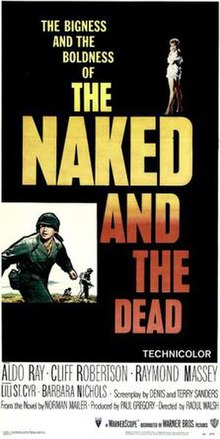The Naked and the Dead (film)
| The Naked and the Dead | |
|---|---|

Theatrical release poster
|
|
| Directed by | Raoul Walsh |
| Produced by | Paul Gregory |
| Written by |
Denis Sanders Terry Sanders |
| Based on |
The Naked and the Dead 1948 novel by Norman Mailer |
| Starring |
Aldo Ray Cliff Robertson Raymond Massey Lili St. Cyr |
| Music by | Bernard Herrmann |
| Cinematography | Joseph LaShelle |
| Edited by | Arthur P. Schmidt |
|
Production
company |
|
| Distributed by | Warner Bros. |
|
Release date
|
|
|
Running time
|
131 minutes |
| Country | United States |
| Language | English |
The Naked and the Dead is a 1958 Technicolor widescreen film based on Norman Mailer's World War II novel The Naked and the Dead. Directed by Raoul Walsh and filmed in Panama, the screenplay attributed to the Sanders brothers adds a strip tease and action scenes to Mailer's original narrative. Made by RKO just before its demise, the film was released by Warner Brothers and was the last one Raoul Walsh directed for that studio.
Filled with flashbacks, it the story of Lt Hearn (Cliff Robertson), an aide to General Cummings (Raymond Massey), who treats Hearn as a son and a friend. The General believes that commanding officers ought to inspire fear in their subordinates, in order to enforce discipline. Hearn expresses distaste for these views, preferring instead that soldiers should have mutual respect for each other, regardless of rank. Hearn is eventually transferred to lead an intelligence and reconnaissance platoon on a dangerous reconnaissance mission.
The platoon had originally been led by Sgt Croft (Aldo Ray), who now must serve under Hearn. Croft is a professional soldier with a reputation for cruelty. Hearn's relatively idealistic approach is contrasted with Croft's desire to win at all costs. When Hearn considers abandoning the mission due to excessive Japanese presence, Croft tricks him into underestimating the enemy. This eventually leads to several deaths in the platoon, and Hearn himself is wounded.
Some of the men head back, carrying Hearn on a stretcher. Croft presses onward with the remaining men. Croft is killed in action, but his men accomplish their mission, relaying vital intelligence to headquarters. Hearn's men consider leaving him to die, as they can escape faster on their own, but decide to continue carrying him despite the risk. The survivors, including Hearn, make it back to headquarters. Once there, Hearn tells the General that the men who carried him on a stretcher did so out of love, not fear.
...
Wikipedia
